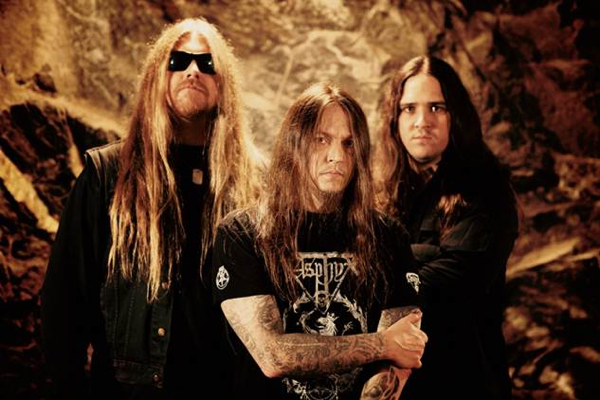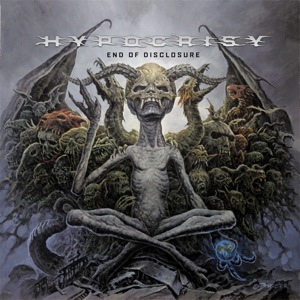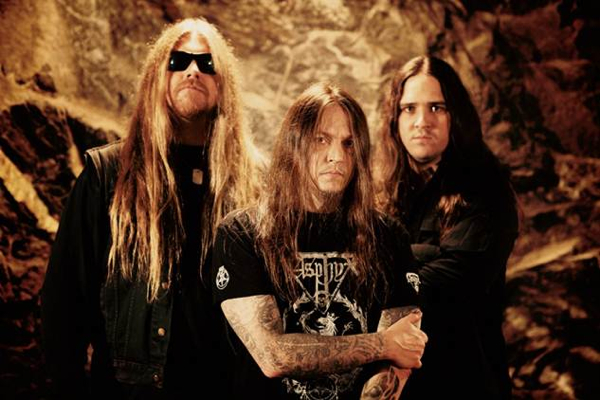Interview: Hypocrisy Mastermind Peter Tägtgren Talks New Album, Production and Gear

Swedish death metal band Hypocrisy — led by vocalist, guitarist, songwriter and producer Peter Tägtgren — have been going strong for more than two decades.
Hypocrisy, who continue to maintain a steady fan base, are now set to release their 12th album, End Of Disclosure, and follow it up with a North American headline tour.
I recently spoke to Tägtgren about the album and tour, and you can read that part of the interview here. Below, Tägtgren talks at length about the album's production and gear. Check it out, along with a couple of tracks off of the new album, and visit Hypocrisy at their official website.
GUITAR WORLD: You've produced almost all of Hypocrisy's albums, including this new one. Did you change anything this time around, or was it the same formula?
I actually took away a lot more. It's not so much of keyboards on the songs overall. It's only on a few songs for a few parts here and there. Mainly on the last two or three albums, when the keyboards are there, they are there from the beginning to the end. I just wanted to make it more dynamic this time, with less instruments and less overdubs, just to make it more clean and simple, more of an AC/DC kind of thing [laughs].
Speaking of gear, what's your setup these days and how much has it changed over the years?
I don't know how much it has changed, really. I mean, in 2002 we went with SansAmp, and on the last tour we did I think I had five Marshall amps hot rodded with the eight Marshall cabs. But this time we're going to go with Kemper. It's like an Axe FX kind of rack. I actually get to simulate the guitar sound I have in the studio. I don't know how it's going to work, but they say it's very simple. I just got it at home today, so I'm going to sit and program it and do everything with it. Hopefully, that's going to be enough. No speakers, only the pre-amps.
Get The Pick Newsletter
All the latest guitar news, interviews, lessons, reviews, deals and more, direct to your inbox!
So it's going to be pretty much like the direct line input thing, which a lot of musicians are using on stage these days.
Yeah, I wish I could be a bigger band playing in front of a lot more people, making a lot more money. If that were the case, I would still go with the cabinets and stuff like that, because that's much cooler. You can feel their sound on your back!
It must be cheaper to do a direct-line input, then?
Yes and no, I guess. On the last tour we had so much of equipment with us, and we didn't go bankrupt [laughs]. We did OK. So I mean, this time it's really more to make it easy when it comes to getting to a new venue and stuff like that. You just plug it in and try to do the PA as good as possible. Plus you always know you're getting your guitar sound every time.
In terms of guitars, what are you currently using and what's been your favorite so far?
I'm hoping now that the favorite is going to be the custom guitar that's going to show up tomorrow or within the next few days. That's going to be very interesting. It's actually an Explorer, but it's in baritone now, and it's made for my tuning. It has the cross in the frets and stuff like that, so it's going to be really cool.
When you're on tour, guitars can take a lot of beating traveling on the road from city to city every night. Do you encounter the problem of them not staying in tune, specially in the middle of shows?
We usually do not tune anything during the concert, specially with Pain. I don't even touch the tuner. I mean, the key thing is to make sure the neck is always in the right position, because when you go from cold to warm, you really can just flip out the whole neck. As long as you check that every day, it should be fine. Always put them up on stage so that they're close to the light and heat you get on stage. Then you only have to tune it before you go up to play, and you can just keep on playing.
When you're not playing a show, do you ever sit with the guitar and try to write riffs in the tour bus or something?
No, never [laughs]. The only time I practice is when I try to practice the song I wrote. That's why I'm not going to be Steve Vai or Yngwie Malmsteen or anything like that, and I have no real desire for that either. I think a good song is stronger than a good musician. When I was a lot younger, I had a different kind of philosophy. But as soon as I started writing music, I had no desire becoming this super solo guitarist. It was just more about writing good songs, and I thought that would overcome a good musician, you know.
These days, specially with extreme metal bands, the only way to make money is through touring. So the amount of touring is increasing every year, I feel. Do you think there will be a time when you actually have to write music on tour, a time when you'll be left with no choice?
No, no, no, no. Fuck no [laughs]. I don't want to go out on these crazy eight-week tours in a row anymore, you know. I like going out for three weeks, going home for a couple of weeks and then go out again. Life is too short, and for me, my philosophy is to have fun. I've been a professional musician/producer for 20 years now, and I really don't want to go insane on a tour bus because it's easy to lose grip on life when you're on tour.
When other bands are working on their music in your studio, do they use your gear at all to get the sound you want them to get?
Yeah, I always want them to bring their own drums, amps and stuff like that because may be we'll find something there that makes it more interesting and better. It's so different from amp to amp. If someone says, "I have a JCM 900 at home," I tell them to bring it because I have one in the studio as well but all these amps sound different no matter what brand it is, because they have tubes and stuff, you know. Sometimes you can find a really great amp that someone owns, and then of course you're going to choose that even if you have the same, because they don't sound the same. It's similar with drums.
You should put your stamp on it, not my stamp. My stamp is to try to get a really heavy, clear sound. That's the only stamp I would like to have. But I don't want the guitars or the drums to sound the same.
Andrew Bansal is a writer who has been running his own website, Metal Assault, since early 2010, and has been prolific in covering the hard rock and heavy metal scene by posting interviews, news, reviews and pictures on his website — with the help of a small group of people. Up till February 2012 he was based in Los Angeles. After that, he had to move to India, but is still carrying on his heavy metal endeavors with the same intensity.


“There’d been three-minute solos, which were just ridiculous – and knackering to play live!” Stoner-doom merchants Sergeant Thunderhoof may have toned down the self-indulgence, but their 10-minute epics still get medieval on your eardrums
“There’s a slight latency in there. You can’t be super-accurate”: Yngwie Malmsteen names the guitar picks that don’t work for shred

![A black-and-white action shot of Sergeant Thunderhoof perform live: [from left] Mark Sayer, Dan Flitcroft, Jim Camp and Josh Gallop](https://cdn.mos.cms.futurecdn.net/am3UhJbsxAE239XRRZ8zC8.jpg)







